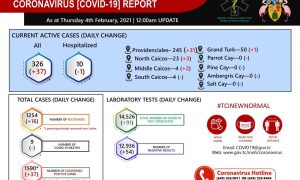Kingston, Jamaica, January 18, 2025 – A new state-of-the-art immunohistochemistry (IHC) machine, installed at the National Public Health Laboratory in Kingston, was commissioned into service on Wednesday (January 15).
The unveiling of the VENTANA® BenchMark GX, valued US$419,584.38, is intended to strengthen the Ministry of Health and Wellness’ capabilities in managing breast cancer analysis, diagnosis and treatment.
The Ministry partnered with Roche, one of the largest biotechnical companies globally, for the undertaking.
Portfolio Minister, Dr. the Hon. Christopher Tufton, said the acquisition marks a major step in further enhancing Jamaica’s diagnostic capacity, and will support the Ministry’s efforts to improve breast cancer care in the health system.
“The need for diagnostics is a big one in our public health system, and I am prepared to say we are not where we want to be. We have acquired a few mammograms over the last year and there are others that are supposed to be coming in. We… want to ensure that the initial screening, even before lab testing, is easier to assess as we encourage more persons to access,” he stated.
While acknowledging, “We are better off today than we were [approximately] five years ago”, the Minister maintained that “it’s a journey that has to continue if we are to stem the late detection and, unfortunately, the mortality rates in terms of late detection”.
Dr. Tufton emphasised that early diagnosis is critical in providing the necessary treatment and saving lives, noting data indicating that one in 21 women will be diagnosed with breast cancer.
Dr. Tufton indicated that through the ‘Know Your Numbers’ Initiative, more than 100,000 tests were conducted. The initiative aims to encourage more Jamaicans to get screened for lifestyle diseases.
encourage more Jamaicans to get screened for lifestyle diseases.
“We are going to be doing a lot more of that as part of the policy initiative to get more in,” he said, adding that through the Ministry’s mobile health centres, more persons will have access to healthcare services in small towns and communities.
Additionally, Dr. Tufton said more will be done to normalise the concept of screening for lifestyle diseases in order to support early detection and, by extension, a longer and better quality of life, particularly through the Ministry’s primary healthcare reform programme.
Meanwhile, Dr. Tufton said the work undertaken at the National Public Health Laboratory is crucial in providing diagnostics for the tests that have been undertaken through various programmes.
“Right now, on a monthly basis, some 40,000 samples are collected [and] some 200,000 tests are conducted… using approximately 20 machines which essentially provide the critical diagnosis for Jamaicans right across the length and breadth of the country as to their health status, and that is done by 250… employees,” he informed.
Dr. Tufton also indicated that the Ministry is moving towards having adequate diagnostic equipment within all the necessary health facilities as part of “helping or supporting the screening and the determination process as to what the status of the health of an individual is”.
Additionally, he said the Ministry is introducing a policy that will result in the long-term engagement of service contractors to repair and maintain equipment at health facilities.
Meanwhile, Consultant Haemato-oncologist at the Kingston Public Hospital (KPH), Dr. Joye Taylor-Houston, said accurate and early cancer diagnosis is essential in the fight against the disease.
“By improving access to tests, we can enhance patient care and outcomes through early diagnosis and, therefore, reduce the risk of the disease’s recurrence,” she stated.
Dr.Taylor-Houston said the oncology community is committed to the cause of providing comprehensive cancer care that meets the needs of patients.
“This new immunohistochemistry equipment will assist us in providing this level of care,” she added.
Disease Area Strategy Director, Roche Caribbean, Central America and Venezuela, Juan Cruz, said the equipment’s provision will enable Jamaica to optimise the national breast cancer testing regime and improve biomarker testing and diagnosis.
“This collaboration is another important step in the country’s commitment to having the required diagnostic capacity for a personalised approach to breast cancer, continuing the work that we began since 2015,” he said.
General Manager, Roche Caribbean, Central America and Venezuela, Alvaro Soto, acknowledged Jamaica being one of the first Caribbean countries to commence local IHC and continue this process to ensure precise cancer diagnostics.
“This milestone underscores the country’s commitment to enhancing healthcare outcomes through advanced technology. Achieving precise and early cancer diagnosis is crucial in the fight against this disease. With this new equipment, we are optimistic about the significant improvements in patient care,” he said.
Roche’s investment in the installation, maintenance and provision of test reagents for the equipment represents 86 per cent of the total cost.
The remaining 13.52 per cent allocated by the Health Ministry is for test reagents.
CONTACT: CHRIS PATTERSON
Release: JIS
Photo Caption: Minister of Health and Wellness, Dr. the Hon. Christopher Tufton (second right), listens as Senior Medical Technologist at the National Public Health Laboratory in Kingston, Lincoln Fisher (second left), explains the functions of the new state-of-the-art VENTANA® BenchMark GX immunohistochemistry equipment, which was installed at the facility and commissioned into service on Wednesday (January 15). Also listening (from left) are Disease Area Strategy Director, Roche Caribbean, Central America and Venezuela, Juan Cruz; and Director, National Laboratory Services, Dr. Marline Tapper.
Photographer: Michael Sloley


 News1 week ago
News1 week ago
 Bahamas News5 days ago
Bahamas News5 days ago
 Bahamas News4 days ago
Bahamas News4 days ago
 Caribbean News1 week ago
Caribbean News1 week ago
 News1 week ago
News1 week ago
 Health4 days ago
Health4 days ago
 News1 week ago
News1 week ago













